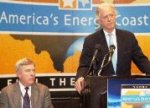Blue Ribbon Committee to Address Resiliency for Gulf Coast
America’s WETLAND Foundation has launched an 18-month program that will involve communities from Texas to Florida.
The America’s WETLAND Foundation (AWF) has announced the “Blue Ribbon Resilient Communities: Envisioning the Future of America’s Energy Coast” (BRRC) initiative to help Gulf Coast communities from Texas to Florida – including Galveston and Houston – prepare for resiliency against the threats of storms, coastal erosion, and disasters like the BP oil spill.
The AWF initiative, chaired by Louisiana Lt. Gov. Jay Dardenne and co-chaired by commissioner of the Texas Commission on Environmental Quality, Buddy Garcia, will host 12 community leadership forums across the five Gulf states of Texas, Louisiana, Mississippi, Alabama, and Florida.
During the 18-month initiative, communities will consider new data about coastal vulnerabilities, including a recently released Gulf Coast Adaptation Study on protective measures, and will determine plans and actions needed to ensure a sustainable future.
“There’s value in Texas’ bonding with our sister Gulf states,” said Garcia. “By building a broad coalition and working together as a cohesive region, we can move forward together.”
Alabama State Senator Vivian Davis Figures and State Representative Randy Davis, both of Mobile, agreed to co-chair the initiative.
“Although divided by state lines, this is one, vast and vulnerable coastal environment we all rely upon to support us economically and, in too many cases, it is degrading in front of our very eyes,” said Figures. Davis noted a move of populations away from the coast due to high insurance cost and lost coverage, which will have long-term impacts. “We need a sustainable environment as populations shift and the ecosystem is altered,” said Davis.

Entergy CEO Wayne Leonard, left, and R. King Milling, chair of America's WETLAND Foundation, performed a $4 million, 18-month study of 800 Gulf Coast ZIP codes from Texas to Alabama, the area known as America's Energy Coast, that shows coastal losses will be $350 billion (with economic multipliers) to $700 million over the next 20 years unless governments and individuals opt for cost-effective ways to combating rising sea levels and growing intensity of storms. Photo by Bevil Knapp for America's WETLAND Foundation.
The communities will be given economic data from a $4.2 million study commissioned by Entergy and AWF that shows the cost of doing nothing could result in $350 billion in losses over the next 20 years across the four America’s Energy Coast states of Texas, Louisiana, Mississippi, and Alabama. Each community will receive local data gleaned from the study. The BRRC process will help local stakeholders determine core values and how to protect them, based on their vulnerabilities and the tools and options available to them.
“The economic and environmental consequences of not restoring this degrading ecosystem is even greater than we thought,” said R. King Milling of New Orleans, chair of the America’s WETLAND Foundation, who announced the initiative recently in Plaquemines Parish, one of the most vulnerable coastal communities on the Gulf Coast. “There is an urgent need to empower our local citizens to envision their future and make critical decisions, given these facts.”
As a result of the initiative, BRRC strives for the following outcomes:
- Sustain the ecological, economic, and cultural values of Gulf Coast communities;
- Reduce risks associated with natural and man-made disasters and vulnerabilities;
- Provide communities the tools to make decisions and plans based on realistic timelines; and
- Empower communities to take decisive actions to ensure a sustainable and prosperous future.
Gary Serio, vice president of corporate safety and environment for Entergy, said the company produced the one-of-a-kind report on coastal infrastructure vulnerability across the Gulf “because it is essential to our future to have safe and secure communities in which people can live and prosper and business and industry can operate.This report revealed information that is meaningful for all the citizens of the Gulf Coast and a sobering reality for the nation if they do not prevent the consequences of allowing further deterioration of this coast.”
Lake Charles Mayor Randy Roach said he’s pleased his city will host the first Blue Ribbon Resilient Community Leadership Forum in March. “Southwest Louisiana is home to the coastal Chenier Plain and vegetated wetlands of Cameron and Vermillion parishes. These areas are still recovering from the economic effects of Hurricanes Rita and Ike,” Roach said. “Their future affects us all and therefore demands the immediate attention of all who want to save their communities and the cultures that make them unique. The clock is ticking and with each day the loss of our land and culture is incalculable.”
The America’s WETLAND Foundation manages the largest, most comprehensive public education campaign in Louisiana’s history, raising public awareness of the impact of Louisiana’s wetland loss on the state, nation, and world.